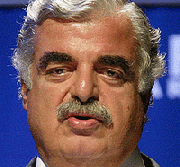BEIRUT — A potentially explosive murder investigation which has gripped the Middle East for four years moved from Lebanon to the Netherlands this week with the launch of a landmark international tribunal.

|
|
Supporters of Rafik Hariri, the former prime minister of Lebanon, visit his grave in Beirut. |
“After four years of waiting and desperately fighting all kinds of resistance (to the tribunal’s formation) we have finally won this battle for truth and justice,” Marwan Hamade, a former minister, told TIME. Hamade narrowly survived a car bomb assassination attempt in October 2004, the first of the attacks included in the U.N. investigation.
The burning question is whether top Syrian officials will be called before the tribunal. Syria, which politically controlled Lebanon at the time of Hariri’s death, remains the chief suspect in the murder. An initial report by a U.N. commission, which began investigating Hariri’s death in 2005, implicated several senior Syrian and Lebanese officials. Subsequent reports, however, have been scant on detail, and it remains unknown what evidence the commission has amassed. Daniel Bellemare, the head of the U.N. commission for the past year, was expected to continue the investigation when he took up the role on March 1 as chief prosecutor for the tribunal.
Syria denies any involvement in Hariri’s death and says it supports an independent investigation. “Nobody wants to drown the investigation,” said Sami Moubayed, a Syrian political analyst. “On the contrary, in the best of all possible worlds, the Syrians want the probe to carry out, be neutral, and prove, at the end of the day, that Syria was innocent.”
It could be a long, tense and potentially dangerous wait before indictments are issued and trials begin. U.N. Secretary-General Ban ki Moon reportedly has said that the courtroom will be ready for trials at the beginning of 2010. Robin Vincent, the tribunal’s registrar, has said that the trials could last five years. In welcoming the launching of the tribunal, Lebanese Prime Minister Fouad Siniora said, “The Lebanese do not seek vengeance, they only wish to protect their country and prevent the terrorists from persisting in their crime unpunished.”
The tribunal is located in Leidschendam, a suburb of the Hague in the Netherlands. Eleven judges, four of them Lebanese, have been selected for the tribunal, although their names are being kept secret for now for security reasons. Preparations are being made for the transfer of suspects and witnesses to the Hague, and a witness protection program is being arranged.
Last week, a Lebanese judge freed on bail three suspects who were arrested in 2005. However, four generals who headed state security organs at the time of Hariri’s murder are to be extradited to the Hague within the next month at Bellemare’s request. The four generals, including the once powerful head of General Security, have been in custody for the past three-and-a-half years.
As the net closes in on the assassins, many in Lebanon are bracing for more instability. Lebanon already faces a tense period in the months leading to knife-edge parliamentary elections scheduled for June 7. “The establishment of the tribunal faced many difficulties, and I do think that as we get closer to the killers we might have more trouble,” Hamade said.
No other international tribunal has been established on the basis of one man’s murder (others such as those for Rwanda and the former Yugoslavia dealt with genocide and war crimes), making it unique in the relatively new field of international jurisprudence — and highly political as well.
Amnesty International, the human rights watchdog, suggested that the tribunal was “politically selective” and that it should address the enormous number of other serious crimes committed in Lebanon in recent decades, especially during the 1975-1990 civil war. “The mandate is by far the narrowest of any tribunal of an international nature,” Amnesty said in a statement issued Friday.
Political bias has dogged the U.N. investigation since its inception. It is widely held that the U.N. investigation owes its existence to the interests of the U.S., which saw it as a useful tool to pressure Damascus into better behavior in Iraq, cease meddling in Lebanese affairs and to drop its backing for militant anti-Israel groups such as Lebanon’s Hizbullah.
Even the probe’s closest supporters concede that if Israel had been the chief suspect in the Hariri murder, the investigation would never have existed.
Syria, however, has begun to emerge from its recent international isolation. On Friday, a senior State Department official met the Syrian ambassador to Washington, the first official contact in months. Washington also is considering appointing a new ambassador to Damascus. The previous ambassador was withdrawn in the wake of the Hariri assassination.
But a rapprochement with the West and the possibility of resumed peace talks with Israel could be derailed if the tribunal issues indictments for senior Syrian figures. Given the stakes, it is no surprise that suspicions have arisen of a deal being concocted in which the Syrian leadership is spared prosecution in exchange for progress on peace with Israel, loosening its close ties to Iran and an end to meddling in Lebanon.
The U.N. has established a committee to monitor interference in the judicial process and insists that the tribunal will remain impartial. In an open letter to the Lebanese, Bellemare said that he would “not be influenced by any political consideration.”
“Justice cannot and should not be used as a political tool,” he said. Reassuring words, perhaps, but many Lebanese continue to suspect that the cold realities of politics could trump the loftier cause of justice.
Reprinted from Time.com.






Leave a Reply